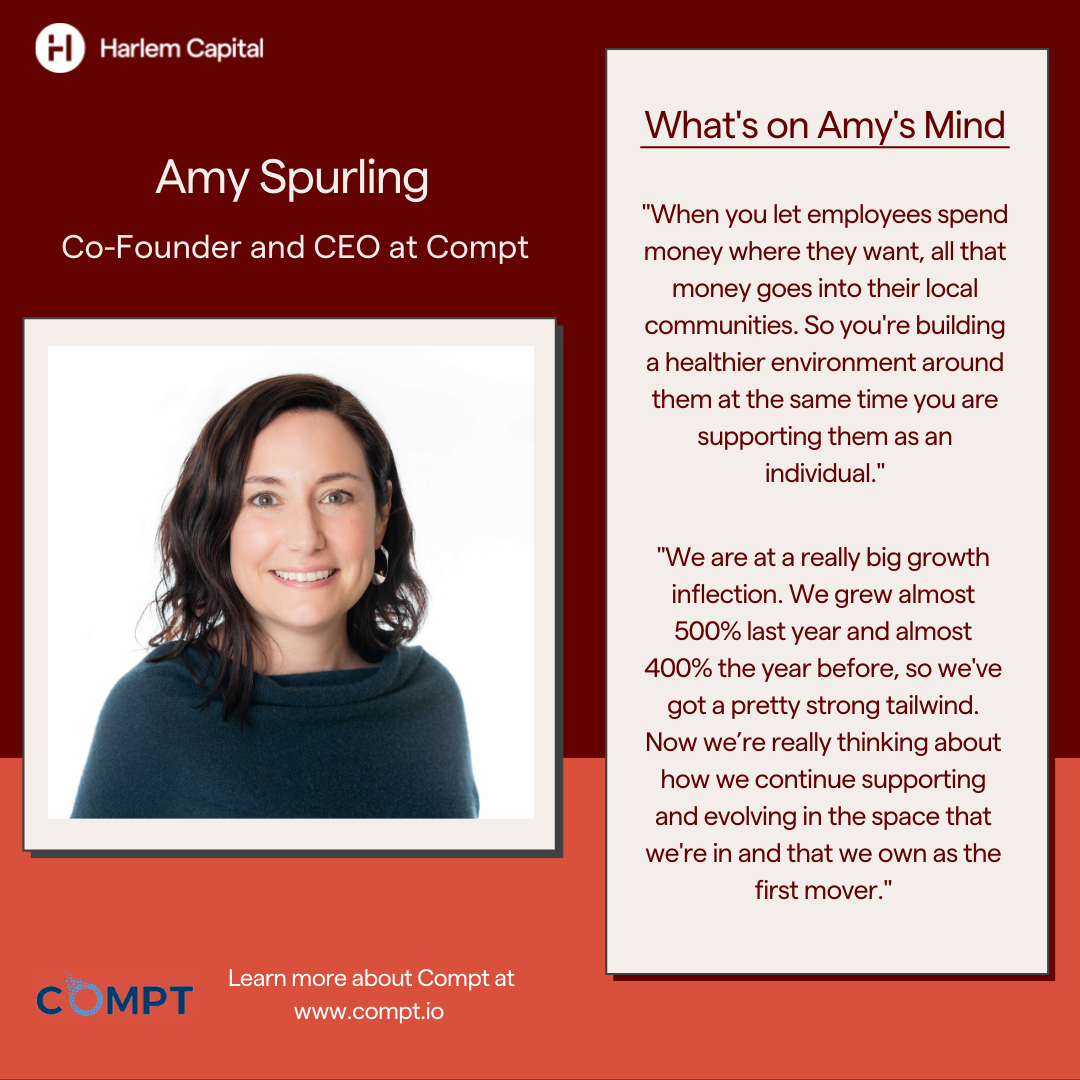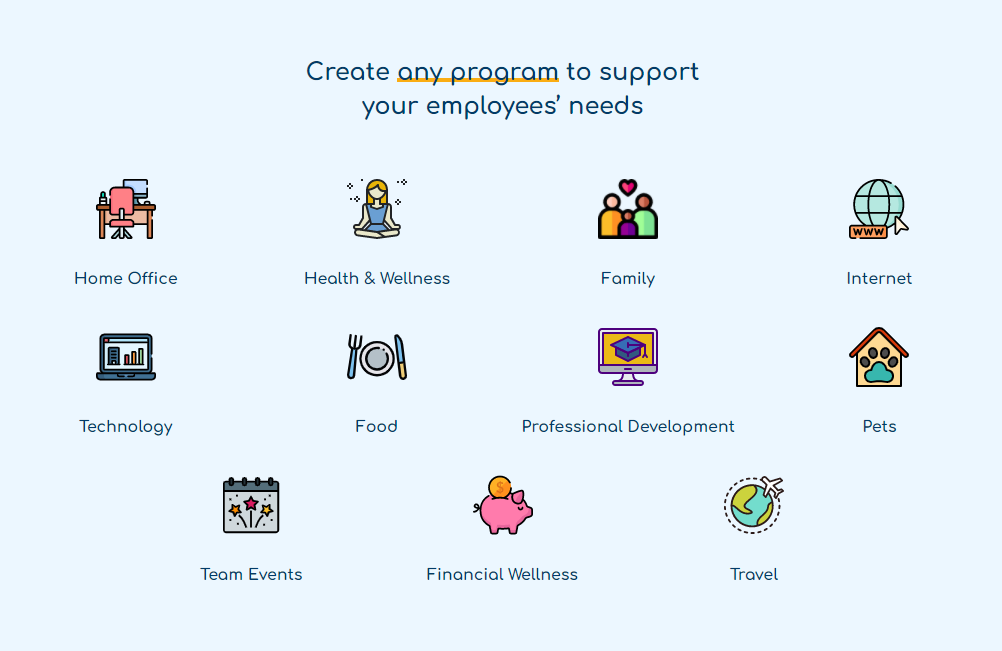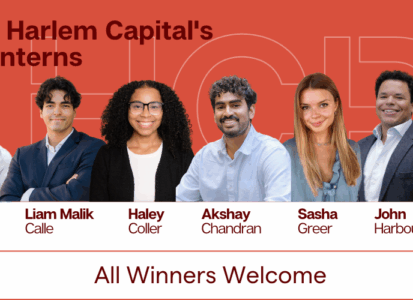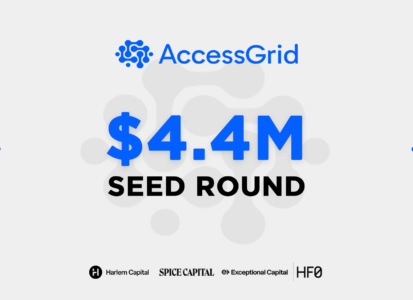HCP Founder Spotlight – Compt
by Harlem Capital

HCP introduced the Founder Spotlight Series in August 2021 to highlight our exceptional founders who are changing the face of entrepreneurship. Today we feature Amy Spurling, Founder and CEO of Compt. Amy shares the catalyst for Compt, her view on the future of work, and invaluable advice for founders.
This interview has been edited and condensed for clarity.
HCP: Tell us a little bit about yourself and your professional background.
Amy: I’ve been in tech and startups for about 20 years and have been a CFO and COO multiple times. I helped build six companies prior to starting Compt. Though I was never a founder, I was always brought in by the board as the first executive to work with first time founders and help them raise money, scale the business, and hire people.
HCP: What motivates you and why?
Amy: I’m a very self-motivated and self-competitive person. One of the things that really motivates me is thinking about how you change the dynamic from a work perspective. A lot of my prior companies were like typical tech companies: 80% white and male. I don’t like that and I don’t think that helps build the best company. You need a lot of perspectives and diversity around the table. I want to be a voice and a person that helps affect a lot of change to have an impact on the world around me.
HCP: What is Compt?
Amy: Compt at a functional level helps companies build, manage, and design employee perk stipends. Those are the mechanisms for creating this ability for employees to have real personalization in that last 20% of their compensation, the first 80% being salary and health insurance.
HCP: Could you share some specific examples of the kinds of stipends that can help create more inclusion or equity in the workplace?
Amy: It’s really taking it to more of a thematic place. So for example, a company could offer family benefits as part of a stipend. What that traditionally means is fertility benefits or childcare which are great, but impact a very small percentage of any given company. So by broadening that concept, to recognize that every single person has a family, though who they determine to be in their family can be different, you can be inclusive of literally every single person. By using stipends, you can really get to employee personalization, which allows you to support a broader base of employees.

HCP: You started Compt in 2018 in the pre-pandemic world, but COVID-19 has shifted the way that we work. How have you had to adjust to the new working norms?
Amy: We were ahead of the curve. The demand for personalization was already happening, which is why I wanted to start this company. Even when you get down to something like team lunch, every single person wants something different. So that hasn’t changed. What has gotten louder is that now even attempting to do this in any other way just doesn’t work. Before you at least could do Taco Tuesdays and yes, 20% of your team would be upset about it, but now, if you had 1000 employees, you have 1000 offices, so how are you possibly going to functionally do that?
This didn’t really change the platform at all. It just accelerated our growth because it forced a cataclysmic shift in the market, where on March 17, 2020, the whole world went remote in one day. It’s the biggest shift of our entire lifetime that we will ever see in the way we work and it happened for everyone at the same exact moment.
HCP: How have you and the companies you support through Compt measured the success of your corporate programs, particularly when compared to the traditional perks?
Amy: The way we think about ROI and success is around employee engagement with the perks. If you look at traditional employee perks with individual vendors like a student loan forgiveness provider, fertility benefit, or pet insurance, you typically see low utilization of 3% to 5% because everyone wants something different. The more vendors you offer, the less anybody uses because it’s too noisy.
With our platform, the way we measure success is:
1. What portion of employees are using their funds?
2. What portion of their funds are they using?
For us, it’s over 90% utilization, so off the charts engagement compared to what you would ever see with an employee perks program, which is why we’re super sticky with our customers. The biggest way this is a big differentiator for customers is in helping retain talent and attract candidates.
HCP: Compt supports a range of employee perks, from health and wellness to professional development. Are there any unexpected trends that you noticed in perk preferences overall or by industry?
Amy: We’ve noticed a couple of interesting trends. One is what personalization really looks like. We actually pulled data on 8,700 of our users last year and over the course of 12 months, they used 27,000 different vendors. Everyone wants something different. That’s true across industries, countries, and along any spectrum. So when you’re looking at personalization and a high level of engagement, you need to think about this more broadly. That was one of our big learnings.
The other is the range of vendors. If you have a vendor platform you’re going to use big box names to reach as many of your people as possible. When you remove that and let employees spend money where they want, all that money goes into their local communities. As a company, you’re actually supporting the communities that are surrounding your employees that now live all over the place. So you’re building a healthier environment around them at the same time you are supporting them as an individual. That has a huge impact!
HCP: So much of your work seems mission-driven. What are Compt’s company values?
Amy: Our values are around balance and belonging. Balance both within our company by making sure that we have diversity, but then within our own personal lives by being able to have work-life balance. We want to build a sustainable, scalable business while thinking about how to automate as much as possible as early as possible so that you don’t have to work 100 hours a week.
When we think about the diversity of the team, our customers and the employees of our customers represent the world. We’re supporting employees in 54 countries; we need to reflect what our user base looks like so that we can understand their perspectives and build the product to be applicable to their lives. So having as much of that diversity on the team as possible across generations, genders, orientations, race, and countries of origin is really critical.
HCP: What led you to be interested in partnering with Harlem Capital?
Amy: I had been tracking them for a while and knew I wanted to work with them. I loved what they were building, who they supported, and their approach to investing. A lot of impact funds that support underrepresented founders are small and don’t provide an ability to have any kind of follow-on. I fully support them and I think they’re absolutely critical, but I also wanted somebody who wasn’t thinking about it as charity.
At Harlem Capital, they’re running a VC fund, and I respect that. They’re looking at companies in a different way and recognizing that some pretty cool stuff is coming from underrepresented founders. Their approach to diligence was different, they asked better questions, got to the heart of the matter, and understood our space really quickly, and it’s just been such a fantastic experience working with them.
HCP: Thank you for the kind words! What does the next chapter look like for Compt?
Amy: We are at a really big growth inflection. We grew almost 500% last year and almost 400% the year before, so we’ve got a pretty strong tailwind. Now we’re really thinking about how we continue supporting and evolving in the space that we’re in and that we own as the first mover. We’re also thinking about expanding into where HR is going next, both within the platform and creating that all-in-one experience.
This means keeping an ear to the ground. We’ve launched a few different features over the past year that we accelerated based on the feedback we got from our HR leaders, and they’ve gotten incredible adoption. You need to listen to your customers and solve their pain points as opposed to coming up with an idea and hoping it’s something they love. That just doesn’t work very well for HR. So it’s a really interesting ecosystem and dynamic as we think about building, growing, and scaling from where we are.
HCP: What advice do you have for other founders or people who might just be starting out? What are the key things that you’ve learned that you would advise them on?
Amy: It’s a very long list and I think some of it depends on the industry, but I’ll look at it more for B2B SaaS.
1. Know what your expertise is and make sure that you have folks around you that complement your skills and have different types of experience.
2. Numbers matter; the numbers don’t lie. You can have a brilliant product idea but if you don’t run the numbers and see that you can actually make money off of it, you can end up building something amazing that nobody wants.
3. Bring in marketing early. If no one knows your product exists and you don’t have some sort of a natural viral loop, you’re dead in the water. At most of my prior companies marketing was massively underfunded, and I think that was a big miss. Even in the companies that did well, we would have done so much better so much earlier if we had invested in marketing.
HCP: If you weren’t the CEO of Compt, what would you be doing instead?
Amy: I’d be hiking the Camino de Santiago in Spain! It’ll happen at some point.
HCP: Where can readers learn more about your business? Plug your socials!
Amy: Our website www.compt.io or follow us at ComptHQ on Twitter.


